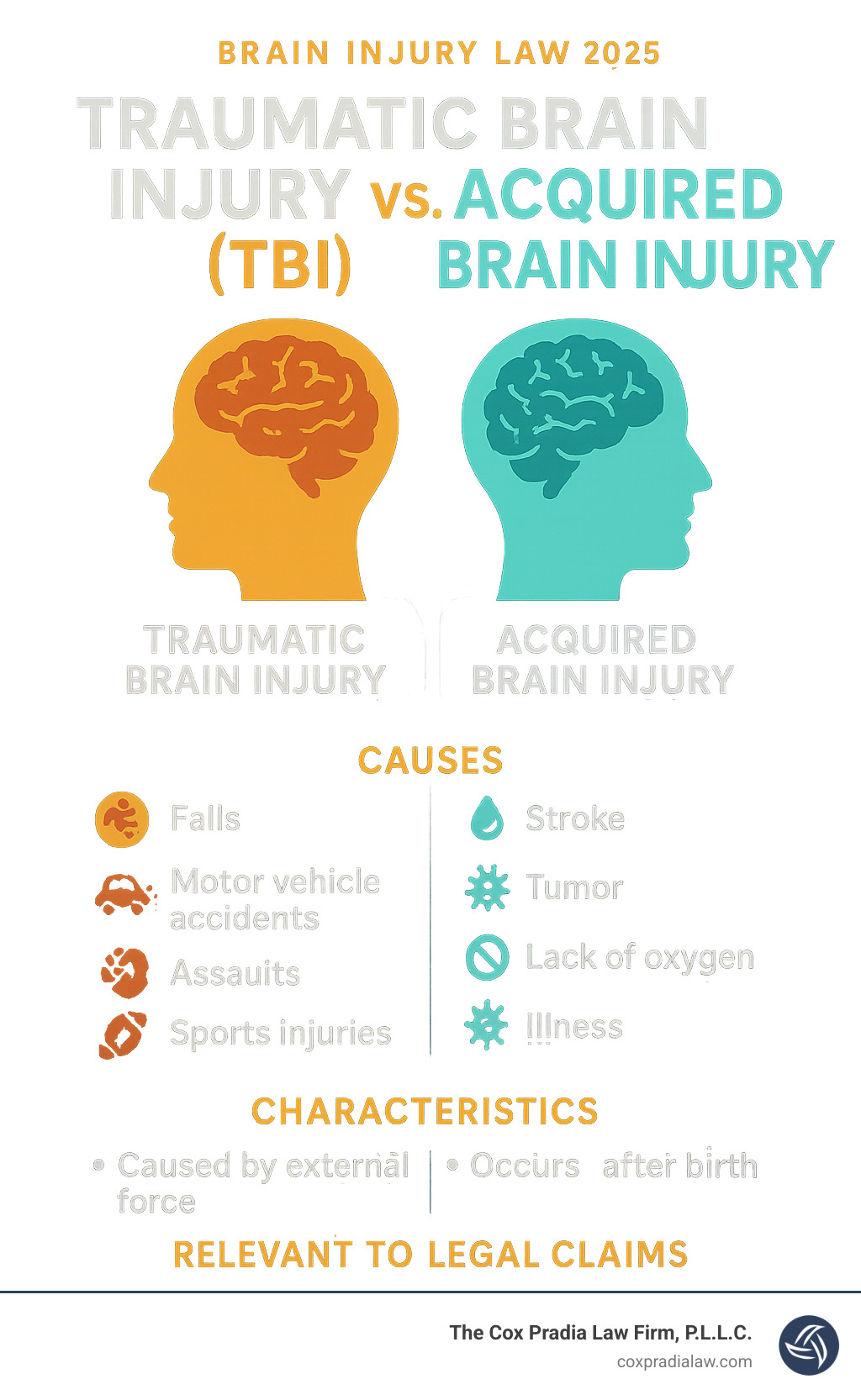Understanding Your Legal Options After a Brain Injury
Understanding brain injury law is crucial if you or a loved one has suffered a brain injury due to someone else’s negligence. It provides a path to seek justice and compensation.
Here’s what brain injury law generally covers:
- Legal Claims: Filing lawsuits to get money for your injuries.
- Compensation: Getting funds for medical bills, lost income, and pain.
- Liability: Figuring out who is responsible for the injury.
- Proof: Gathering evidence to show the injury and its cause.
- Advocacy: Having a lawyer fight for your rights against insurance companies.
A brain injury can change everything in an instant. It often brings huge medical bills, lost wages, and emotional distress. If this happened to you in an accident, you likely feel overwhelmed and frustrated. This guide will help you understand your legal rights and options.
Jonathan H. Cox, Esq., brings over two decades of legal experience, including extensive trial work as a former Assistant District Attorney, to his focus on personal injury and brain injury law. He co-founded The Cox Pradia Law Firm to compassionately advocate for accident victims and their families.
Understanding Brain Injuries in a Legal Context
When a brain injury is the result of another person or company’s negligence, it becomes a legal matter as well as a medical one. In Texas courts we usually deal with two broad categories:
- Traumatic Brain Injury (TBI) – damage caused by an external force, such as a crash or fall.
- Acquired Brain Injury (ABI) – any non-congenital brain damage; in the courtroom we focus on ABIs that flow from negligent acts (for example, oxygen loss during a botched surgery).
Typical TBIs you may see in a Houston-area claim include:
- Concussion (mild TBI) – often invisible on scans but still disruptive.
- Contusion – a localized bruise on the brain tissue.
- Diffuse Axonal Injury (DAI) – widespread shearing of nerve fibres, common in violent vehicle rotations.
- Anoxic / Hypoxic Injury – lack of oxygen, sometimes from near-drowning or medical error.
For more medical detail, see Scientific research on TBI symptoms and causes.
How Doctors Rate Severity
Physicians rely on the Glasgow Coma Scale (GCS):
- Mild (13–15) – may involve no loss of consciousness but lingering symptoms.
- Moderate (9–12) – longer confusion or unconsciousness.
- Severe (≤8) – extended coma or permanent impairment.
Regardless of the initial score, long-term effects can include cognitive deficits, chronic headaches, balance problems, mood swings and depression.
Common Negligence-Based Causes in Texas Claims
- Motor-vehicle, truck and motorcycle crashes
- Slip-and-falls on unsafe property
- Workplace incidents (especially construction)
- Contact sports managed without proper protocols
- Medical malpractice (surgical or birth oxygen loss)
- Defective safety gear or auto parts
- Assaults
If any of these events happened in Houston or elsewhere in Texas, brain injury law gives you the right to seek compensation. Learn more here: What a Houston car wreck attorney can do for severe injuries.
Navigating Your Claim: The Essentials of Brain Injury Law
A successful Texas personal-injury case must prove four elements:
- Duty – the defendant owed you reasonable care (for example, drivers must obey traffic laws).
- Breach – they violated that duty (speeding, poor maintenance, unsafe product, etc.).
- Causation – the breach is a substantial factor in your brain injury.
- Damages – you suffered quantifiable losses.
Insurers often downplay invisible injuries or blame prior conditions. Our job is to counter those tactics with solid medical evidence and, when necessary, take the matter to trial. See how evidence shapes a case: The role of evidence in building a case.
Why You Need a Brain-Injury-Focused Lawyer
- Complex medicine – many mild TBIs never show on CT or MRI; expert testimony is essential.
- Future costs – neuropsychologists, life-care planners and vocational experts help value decades of care and lost earnings.
- Maximum recovery – insurers watch which firms actually try cases. Our courtroom record in Houston often leads to higher settlements.
Read more: How Houston injury lawyers help maximize your claim.
Damages You May Recover
- Economic: medical bills (past & future), rehab, lost wages, diminished earning capacity, home or vehicle modifications.
- Non-economic: pain, suffering, emotional distress, disability, loss of enjoyment, spouse’s loss of consortium.
- Punitive (rare): available when the defendant’s conduct was grossly negligent, e.g., drunk driving.
How numbers are calculated: How an auto accident attorney calculates damages.
Legal Timeline in Texas
- Free consultation
- Investigation & evidence gathering
- Filing suit before the 2-year statute of limitations expires
- Findy (exchange of evidence)
- Mediation / settlement talks
- Trial if no fair offer is made
Every case is unique, but most brain-injury matters resolve in 12–30 months.
Choosing the Right Legal Advocate for Your Case
Not all personal-injury lawyers handle brain injuries, and very few have tried them before a jury. When you interview firms, ask:
- What percentage of your practice is devoted to brain injury?
- Have you taken similar cases to verdict in Harris County?
- Who will handle day-to-day questions?
- How are experts and case costs funded?
- Can you show past results (settlements or verdicts) in TBI matters?
We work on a contingency basis – no fee unless we win – and advance all costs, so financial barriers never block access to justice. For a deeper checklist, see A complete guide to choosing a personal injury lawyer in Houston.
Texas-Specific Rules You Should Know
- Modified comparative fault (51 % rule): if you are 51 % or more to blame, you recover nothing; 50 % or less and your award is reduced by that percentage.
- Damage caps: they apply only in medical-malpractice cases – not in ordinary auto or premises cases.
- Local knowledge matters: familiarity with Houston judges, juries and medical networks helps move cases faster and more effectively.
More on local representation: More info on hiring a concussion lawyer in Houston.
Life Beyond the Lawsuit: Support and Rehabilitation
Legal recovery is only part of the journey. Most clients also need a coordinated care team, which can include:
- Physical & occupational therapists – restoring strength, balance and daily-living skills.
- Speech therapists & neuropsychologists – treating communication and cognitive issues.
- Case managers – coordinating appointments and insurance benefits.
Community groups such as the Brain Injury Association of America and local Houston support circles offer education and peer encouragement. See TBI treatment and rehabilitation for additional resources. Our firm regularly connects clients with these services and fights to ensure settlements cover the full cost of long-term care.
Frequently Asked Questions about Brain Injury Law
How much is my case worth?
There is no one-size-fits-all figure. We look at injury severity, current and future medical costs, lost earnings, life-care needs, comparative fault and insurance limits. After collecting the necessary records and expert reports, we can give a tighter range.
How long will the case take?
Most Houston brain-injury lawsuits resolve in one to three years. Factors include medical complexity, the defendant’s willingness to negotiate and court scheduling. While fast cash can be tempting, patience usually leads to better results.
What if I can’t afford a lawyer?
Our firm – like most reputable personal-injury practices in Texas – works on a contingency fee. You pay nothing up front. We advance all costs and are paid only from a successful settlement or verdict. Your initial consultation is free. For more, read 3 questions for a traumatic brain injury attorney.
Conclusion: Taking the First Step to Protect Your Future
Wow, we’ve covered a lot, haven’t we? From understanding the different kinds of brain injuries to navigating the ins and outs of brain injury law, our hope was to shed some light on a really tough situation. A brain injury isn’t just a medical issue; it changes lives, affecting everything from daily routines to financial stability. But here’s the important takeaway: you have rights, and there’s a path forward to seek justice and rebuild.
One of the most crucial things you can do is act quickly. We know it’s incredibly hard when you’re dealing with the aftermath of an injury. Your main focus should absolutely be on your recovery. But getting medical help right away, and then reaching out to a specialized lawyer, can make all the difference. This prompt action helps preserve vital evidence and ensures you don’t miss any important legal deadlines. It’s about protecting your future, plain and simple.
That’s where we come in. At The Cox Pradia Law Firm, P.L.L.C., we believe in providing truly compassionate advocacy. We understand the heavy load you’re carrying – the physical pain, the emotional distress, the financial worries. Our job is to take the legal burden off your shoulders. While you dedicate yourself to healing, we’ll be fighting tirelessly, using our extensive trial experience, to secure the compensation you deserve. It’s not just about winning a case; it’s about helping you get back to living your life.
Your future matters. If a brain injury has turned your world upside down because of someone else’s negligence, please don’t hesitate. Reach out for a free, no-obligation consultation. We’re here to listen, to help, and to guide you through every step.
Want to learn more about how we can make a difference for you? Explore our personal injury practice areas to learn how we can help.




